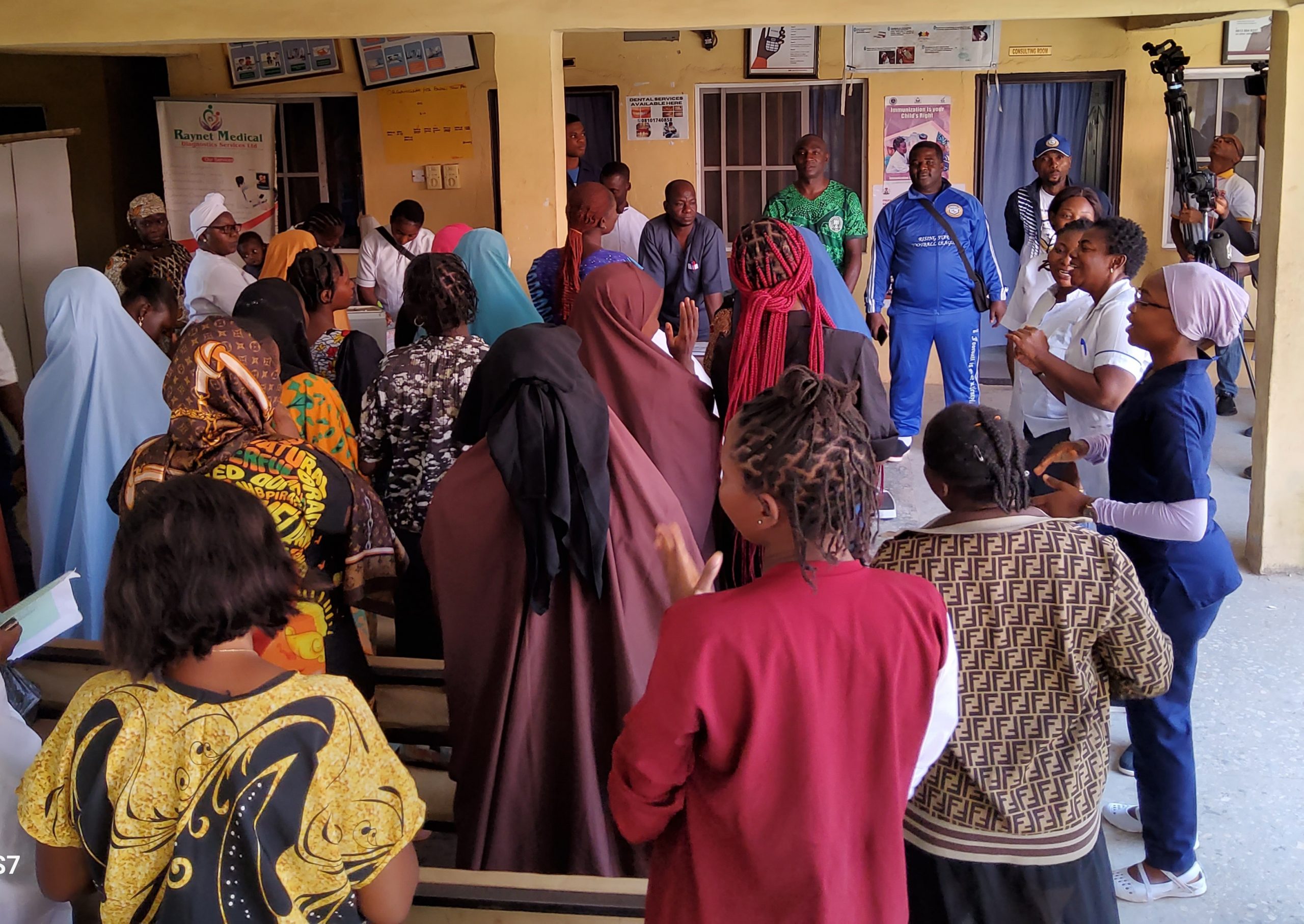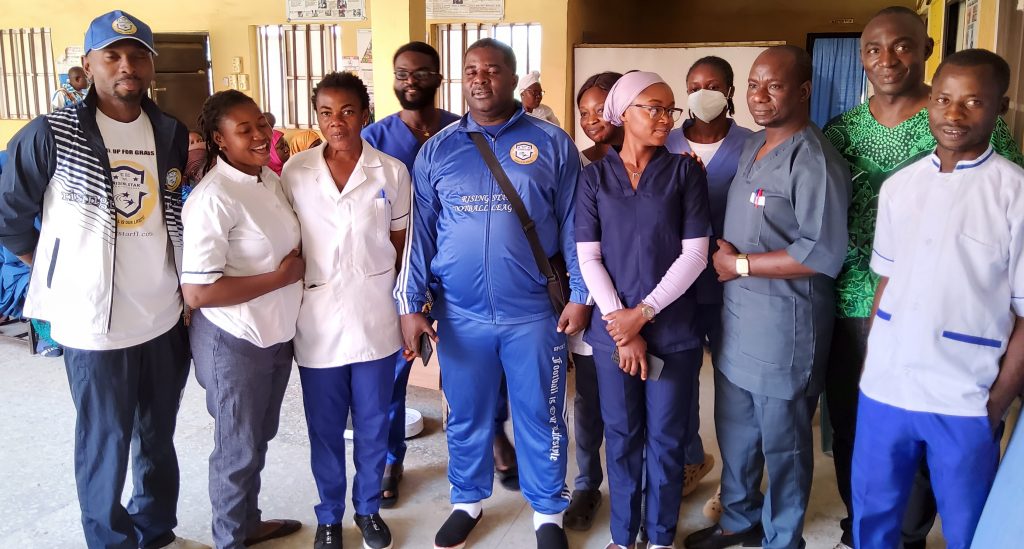Health
Rising Star Footbal League Brings Relief to Over 100 Pregnant and Sick Women

By Joel Ajayi
The Rising Stars Football League (RSFL) brought smiles to the faces of over 100 pregnant and nursing mothers, as well as sick patients, at the Primary Health Care Center in Bwari Area Council, Federal Capital Territory, Abuja. Driven by a desire to support underprivileged individuals, RSFL covered maternity bills and provided essential supplies from registration through delivery, including routine medication, easing financial burdens for many.
In line with their commitment to community development, RSFL representatives visited the hospital on Wednesday, paying for the maternity needs of pregnant women and supporting nursing mothers. This compassionate gesture aligns with RSFL’s ongoing mission not only to promote youth talent in sports but also to give back to society.
Speaking at the hospital, RSFL Project Coordinator Ifeanyi Kama emphasized that the support extended to these women is part of the organization’s promise made during the 2024 Rising Stars Football League season. “RSFL is more than football; it’s about helping communities and developing individuals. We’re creating opportunities for those who lack them, believing that sports can shape better futures and stronger communities,” Kama said.
He further explained RSFL’s outreach efforts beyond football: “We’re reaching out to people in hospitals, schools, and markets, even assisting associations like Okada riders and security outfits. Seeing the joy on people’s faces is a privilege. I feel a sense of joy, as if I could fly. We all know how challenging life in Nigeria is now, and even a small gesture can be life-changing.”
Kama noted that the RSFL plans to extend its outreach to other regions, including an upcoming visit to Lagos.
Expressing gratitude, one of the beneficiaries, Hannah David, a pregnant mother, shared, “I’m so grateful they came to our aid. Many of us cannot afford delivery materials, and RSFL has helped us from registration to delivery. In this tough economy, their support means everything.”
Another expectant mother, Amaka Chukuma, echoed this sentiment: “We deeply appreciate RSFL for paying all our antenatal bills and providing delivery items. Their generosity is truly noble, and we can’t thank them enough.”
Miss Friday Lora, a midwife at the center, lauded the RSFL initiative, saying, “What RSFL has done here is remarkable. Many mothers lack the finances to buy necessary items for their pregnancies. This support in paying bills and providing delivery essentials will make a lasting impact. You can see the joy it brings.”
The Rising Stars Football League continues to make a meaningful difference, bringing hope to communities and demonstrating the power of sports to create lasting, positive change.
Health
Stakeholders Applaud A360 Impact On Adolescent Health

Stakeholders in Nigeria’s health and development sector say the institutionalisation and scale-up of the Adolescent 360 (A360) Amplify project have greatly improved adolescent sexual and reproductive health outcomes in participating states.
They made this known at a dissemination meeting on the project on Thursday in Abuja.
It was implemented by the Society for Family Health (SFH) and partners, and later adopted into government systems following documented successes.
Launched in 2020, the A360 project was designed to provide adolescent girls with access to sexual and reproductive health information, youth-friendly services and economic empowerment opportunities.
The programme was implemented in Kano, Jigawa, Kaduna and Nasarawa States using a human-centred design approach that engaged governments, communities and young people to improve uptake of family planning and maternal health services.
Dr Aisha Sadiq, Permanent Secretary, Kaduna State Ministry of Health, said institutionalising A360 had delivered measurable improvements in adolescent health indicators and community wellbeing.
She said Kaduna currently provides A360 youth-friendly services in 623 Primary Health Care (PHC) centres.
The Matasan Mata Arewa (MMA) initiative, she added, had reached 75 communities and empowered more than 15,000 girls with entrepreneurship skills and seed capital.
According to her, more than 60,000 girls have accessed contraceptives through the programme, with a reduction in discontinuation rates as more young women sustain use and transition to maternal and child health services.
“These changes have shown a marked reduction in maternal mortality among those communities. It has also reduced negative neonatal outcomes,” she said.
Sadiq recounted an elderly woman’s remarks from a programme community, calling them a strong reflection of the project’s success.
“These girls have spent their whole lives believing they will remain tolerable liabilities to the husbands they marry, but now they are realising the value of becoming appreciated assets,” she quoted.
Sadiq added that Kaduna’s 16 per cent health budget allocation and the integration of A360 activities into the state’s 2025 Annual Operational Plan demonstrated sustained political commitment.
Also speaking, Dr Omokhudu Idogho, Managing Director, SFH, said the four implementing states had successfully embedded A360 approaches into government systems, community structures and routine health practices.
He was represented by Dr Kenechukwu Erichalo, Deputy Managing Director, Project Delivery.
Idogho said the project had reached more than one million adolescent girls with family planning services and engaged over 500,000 others with comprehensive sexuality education messaging.
“We recorded more than 50,000 antenatal care visits, ensuring that girls received skilled care that saved lives, and supported over half a million girls to learn income-generating skills,” he said.
He said A360 pioneered the MMA and Niger Girls models, demonstrating that culturally sensitive, human-centred programmes can succeed even in conservative communities.
“Our most significant achievement is institutionalisation. Today, all 1,750 A360-supported facilities are fully government-led,” he added.
Mrs Roselyn Odeh, A360 Project Lead, said the initiative was developed in response to poor adolescent health indices in the country.
She said the programme ensured respectful, youth-friendly services at PHCs and supported school reintegration and entrepreneurship for girls.
She said the decision to scale the programme in northern states was based on data.
“When you look at maternal mortality among young people, you know the section of the country it is coming from. Data drove our decisions in alignment with government priorities,” she said.
Odeh identified challenges including weak PHC infrastructure, funding gaps, commodity shortages and the need to engage husbands in conservative communities.
“But creatively, we worked with governments to mobilise domestic funding through health revolving funds and the Basic Healthcare Provision Fund,” she said.
Mr Sagir Musa, Commissioner for Youth, Jigawa State, assured of continued commitment from implementing states to sustain and expand the project’s gains.
“This project may be nearing closure, but for us, it has just begun. We have gone beyond its life cycle to embed its approaches in the things we do,” he said.
The dissemination meeting brought together policymakers, community leaders, development partners and beneficiaries to review lessons learned and outline future priorities for scaling adolescent health interventions nationwide.
(NAN)
-

 Featured6 years ago
Featured6 years agoLampard Names New Chelsea Manager
-

 Featured6 years ago
Featured6 years agoFG To Extends Lockdown In FCT, Lagos Ogun states For 7days
-

 Featured6 years ago
Featured6 years agoChildren Custody: Court Adjourns Mike Ezuruonye, Wife’s Case To April 7
-

 Featured6 years ago
Featured6 years agoNYSC Dismisses Report Of DG’s Plan To Islamize Benue Orientation Camp
-

 Featured4 years ago
Featured4 years agoTransfer Saga: How Mikel Obi Refused to compensate me After I Linked Him Worth $4m Deal In Kuwait SC – Okafor
-
Sports3 years ago
TINUBU LAMBAST DELE MOMODU
-

 News11 months ago
News11 months agoZulu to Super Eagles B team, President Tinubu is happy with you
-
Featured6 years ago
Board urges FG to establish one-stop rehabilitation centres in 6 geopolitical zones

